

Center for Teaching and Learning. Discussions can play a valuable role in lecture courses, seminars, quiz sections, labs, studios and a variety of other settings.
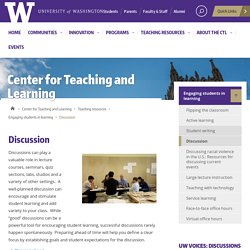
A well-planned discussion can encourage and stimulate student learning and add variety to your class. While “good” discussions can be a powerful tool for encouraging student learning, successful discussions rarely happen spontaneously. Preparing ahead of time will help you define a clear focus by establishing goals and student expectations for the discussion. Planning ahead Establish goals for the discussion: Determine goals based on an assessment of what material students already understand and the areas that they need to explore.Decide what you want students to learn from the discussion. NDLW Online Discussions Moving from compliance to eng. The Big List of Class Discussion Strategies. Listen to this article as a podcast episode: Podcast: Play in new window | Download (Duration: 38:22 — 53.1MB) Subscribe: iTunes | Android | When I worked with student teachers on developing effective lesson plans, one thing I always asked them to revise was the phrase “We will discuss.”

We will discuss the video. We will discuss the story. We will discuss our results. Every time I saw it in a lesson plan, I would add a note: “What format will you use? The problem wasn’t them; in most of the classrooms where they’d sat as students, that’s exactly what a class discussion looked like. So here they are: 15 formats for structuring a class discussion to make it more engaging, more organized, more equitable, and more academically challenging. I’ve separated the strategies into three groups. Enjoy! Gallery Walk > a.k.a. Basic Structure: Stations or posters are set up around the classroom, on the walls or on tables. Student-led%20facilitation%20strategies.pdf. Issues- Student Learning.
Note to Students: You may want to print this document.
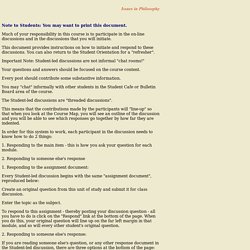
Much of your responsibility in this course is to participate in the on-line discussions and in the discussions that you will initiate. This document provides instructions on how to initiate and respond to these discussions. You can also return to the Student Orientation for a "refresher". Important Note: Student-led discussions are not informal "chat rooms! " Your questions and answers should be focused on the course content. Guidebook-for-Student-Centered-Classroom-Discussions. Using Online Discussion Boards to Facilitate Discussion, Peer Review, and “Q and A” Online discussion boards can be useful tools for facilitating communication with your students—and for helping students communicate with one another—about the course outside of class.
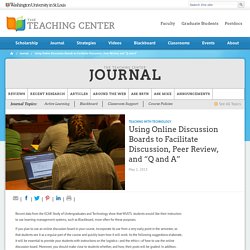
Recent data from the ECAR Study of Undergraduates and Technology show that WUSTL students would like their instructors to use learning-management systems, such as Blackboard, more often for these purposes. If you plan to use an online discussion board in your course, incorporate its use from a very early point in the semester, so that students see it as a regular part of the course and quickly learn how it will work.
As the following suggestions elaborate, it will be essential to provide your students with instructions on the logistics—and the ethics—of how to use the online discussion board. Moreover, you should make clear to students whether, and how, their posts will be graded. I. Ask students to post questions about the assigned readings or homework before coming to class. Redirecting. Facilitating Rich Discussion Board Participation - Online Education Blog of Touro College. On Tuesday, May 27, 2014, Touro College held a webinar for online faculty and administration as part of a series of webinars for professional development of online faculty.

On the webinar, Dr. Gail Bell-Baptiste, Chair of the NYSCAS Education Department, shared tips and tricks for facilitating rich discussion board participation. Below is a list of discussion board tips mentioned on the webinar. Some of these tips were contributed by the faculty members participating in the webinar. Requirements & Guidelines for Students Posts Provide clear guidelines in your class rubric, outlining how often you expect students to post on the discussion boards, and what kind of posts they should add. Teaching with Technology Collaboratory - Improving the Use of Discussion Boards. Considerable research indicates that the effective use of discussion boards results in...
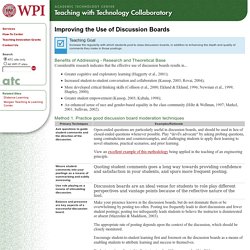
Collison, G., Elbaum, B., Haavind, S., & Tinker, R. (2000). Facilitating online learning: Effective strategies for moderators. Atwood Publishing: Madison, WI. Eklund, J., & Eklund, P. Integrating the web and the teaching of technology: Cases across two universities. (1996). Rovai2007FacilitatingEffectiveOnlineDiscussions.pdf. Redirecting. Redirecting. Encouraging Online Learner Participation. April 8, 2014 By: Joan Thormann, PhD. in Asynchronous Learning and Trends, Online Education Sustained, high-quality student participation usually doesn’t happen on its own in the online learning environment.
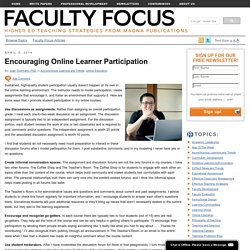
The instructor needs to model participation, create assignments that encourage it, and foster an environment that supports it. 3 Reasons Students Don’t Participate in Online Discussions. ‘Why don’t my students participate in online discussion forums?’

I’ve received numerous comments [questions] like this one, about the lack of student participation in online discussion forums from instructors who appear more puzzled than frustrated. Why don’t students contribute even when their involvement is graded?